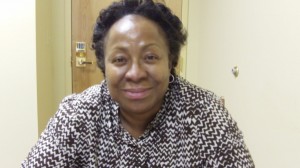February 19, 2014
A Shining Light in the South: UFCW Organizer Rose Turner
In 1981, Rose Turner was a nursing home worker in the deep south. When workers decided to try and organize to join UFCW Local 1529 that year, Rose immediately got involved, hoping to change the working conditions: “At that time there was no family medical leave. Women–when they got pregnant, they went out and came back [after giving birth] and they didn’t have a job. You were penalized for getting pregnant, because you had no job. One woman even slipped in the kitchen a broke her knee, [and in order for her to not lose her job] her daughter had to come work while she was out.”
Rose also wanted to change the fact that the workers had no say on the job. “At that time, what they said was the gospel, and it didn’t make any difference what you had to say. They were always right. But the icing on the cake,” says Rose, is when the nursing home’s census went down, and “they called all the oldest workers in and said ‘You all’ve got to go’. Their seniority meant nothing. One woman had been there for over 25 years, but it was just who they liked [that mattered].”
But with the union, much turned for the better, and the workers were able to get a raise.
Knowing that the collective voice of the union would be stronger with more workers, Rose says she “got a group of ladies together and we would go to the other nursing homes and tell them what we needed to do to organize,” and for the next several years she worked towards organizing other neighboring nursing homes in her community and surrounding areas of Arkansas and Tennessee.
Over those couple of years, Rose’s hard work didn’t go unnoticed. She was soon contacted by the local and was offered a position as an organizer. Hesitant but wanting to try it out, Rose was scheduled to go on 90-day union leave in order to do so, which her nursing home contract allowed for. However, the day before she was to go on leave, her employer claimed that since she was one of the oldest workers at the nursing home, she couldn’t go on leave. Fed up with her employer’s games, Rose decided to go all-in to be an organizer and continue to help make a difference in other people’s lives. “After meeting with the reps at the union–I had heard about unions and seen different things–but just seeing the importance of it, and once I got started, I was sent down to Mississippi and saw people in an even worse condition then we had been at the nursing homes.”
The horrible conditions in Mississippi that Rose refers to were that of catfish workers: “They weren’t allowed to go to the bathroom, except once a day. If they went and stayed over five minutes they were being written up. People were losing their thumbs and whole hands [on the lines]. And they didn’t know that the company would keep them on payroll for only a year and then let them go.”
Through her organizing efforts, Rose has worked for more than 18 years to change conditions such as the ones the catfish and nursing home employees experienced, to help give a voice to the workers.
Looking back, Rose says she feels good about “her nursing homes.” She continues to work on organizing campaigns for nursing homes and other industries in the south, and is currently in Tupelo, Mississippi to organize nursing home workers at Golden Living.
“In the south, the minimum wage ain’t nothin’ but 7.25, but none of my nursing homes make minimum wage–in fact, I’ve got some that make twice minimum wage, plus! I feel good about that.” Thanks to their UFCW contracts, the nursing home workers get raises every year. Rose also notes that “they know how much vacation there’s gonna be, and how much sick days they got (which they never had before). So I feel good because I want to know that I wasn’t the only one that progressed or did good because I was in the union–I want people that come behind me to enjoy the benefits, because if it wasn’t for the people before me, I would never have the chance or the opportunity to do what I do today. I wanna know that when I’m gone, people are enjoying the fruit of my labor. I want them to know that it’s not just about me, but everybody.”
Rose always comes back to those who came before her in the fight for civil and worker’s rights: “People paved the way, and we need to pave the way for others to come.” She also notes how intertwined the movements are, saying that “people realize that civil rights have a got a lot to do with workers rights–it’s just like faith and work–you can’t have one without the other, it just ain’t gonna work. You can have faith but without work behind it, it’s no good, and you can have work, but you’ve got to have faith”.
“I’ve been on the trail a long time,” says Rose, of her involvement in the union. Rose is eligible to retire, but she’s not quite ready yet: “When I retire I wanna know that I have done all that I can do. I’ve got a few other contracts and other things I want to [see through].”
Rose and the others who continue to fight for workers rights are a bright spot in the south, which has traditionally been hostile towards unions. Its thanks to workers and organizers like them that the worker movement is spreading–workers in Chatanooga, TN recently came close to organizing with UAW at the VW plant, and Moral Mondays have spread from Raleigh, NC to cities across the country to bring awareness to social justice issues. Its proof that when people stand together, change it inevitable.
